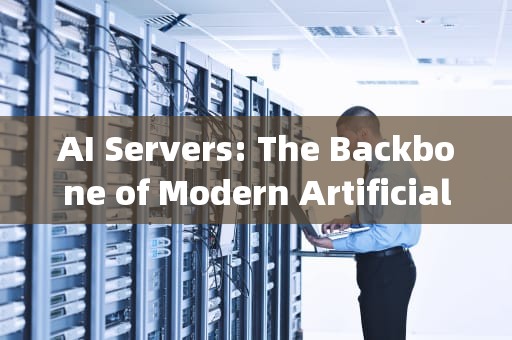In the rapidly evolving landscape of artificial intelligence (AI), the role of specialized hardware, particularly AI servers, has become increasingly crucial. These servers are designed to handle the intensive computational demands required for training and deploying machine learning models, making them indispensable in the realm of AI research and application. This article delves into the significance, architecture, benefits, and future trends of AI servers.

The Significance of AI Servers
AI servers are high-performance computing systems specifically optimized for AI workloads. Unlike traditional servers that primarily focus on processing general-purpose tasks, AI servers are equipped with powerful GPUs (Graphics Processing Units) or TPUs (Tensor Processing Units), which are essential for accelerating the complex mathematical operations involved in AI algorithms.
The rise of AI applications across various industries—such as healthcare, finance, automotive, and entertainment—has led to an exponential increase in data generation. Handling this data and extracting meaningful insights requires robust infrastructure capable of performing massive parallel processing. AI servers fulfill this need by providing the necessary computational power and efficiency, enabling businesses and researchers to develop and deploy sophisticated AI models faster and more effectively.
Architecture of AI Servers
The architecture of AI servers is tailored to maximize performance for AI tasks. Here are some key components that constitute a typical AI server:
1、Processors: While traditional CPUs are still used for certain control functions, AI servers often incorporate multiple GPUs or TPUs to handle the bulk of the computation. GPUs excel at parallel processing, making them ideal for the matrix and vector calculations prevalent in AI algorithms. TPUs, developed by Google, are even more specialized and can offer greater efficiency for specific types of AI workloads.
2、Memory: High-speed RAM is critical for AI servers to store large datasets and intermediate results during model training. Additionally, these servers may use advanced memory technologies such as NVLink or InfiniBand to facilitate rapid data transfer between GPUs and other components.
3、Storage: AI servers require fast and scalable storage solutions to handle large volumes of data. SSDs (Solid State Drives) are commonly used for their speed, while HDDs (Hard Disk Drives) may be employed for cost-effective long-term storage.
4、Networking: High-bandwidth networking options like Ethernet or InfiniBand are essential for distributed AI training, where multiple servers work together to train a single model.
5、Cooling Systems: Given the high computational power and associated heat generation, advanced cooling systems, including liquid cooling or airflow optimization, are often integrated into AI server designs.
6、Software Stack: AI servers come pre-installed with software frameworks and libraries such as TensorFlow, PyTorch, and CUDA, which simplify the development and deployment of AI models.
Benefits of AI Servers
1、Scalability: AI servers can be easily scaled up or down based on the computational requirements of a given task. This flexibility allows organizations to optimize their resources and reduce costs.
2、Speed: With specialized hardware and optimized software, AI servers can significantly reduce the time required for training and inference, enabling quicker iterations and faster deployment of AI models.
3、Efficiency: The parallel processing capabilities of GPUs and TPUs make AI servers highly efficient in handling the complex calculations involved in AI workloads. This efficiency translates to lower energy consumption and reduced operational costs.
4、Reliability: AI servers are built with redundancy and failover mechanisms to ensure high availability and reliability, which is crucial for mission-critical AI applications.
5、Integration: Many AI servers come with APIs and tools that facilitate integration with existing IT infrastructure, making it easier to incorporate AI capabilities into current workflows.
Future Trends in AI Servers
As AI technology continues to advance, several trends are likely to shape the future of AI servers:
1、Increased Specialization: Future AI servers will likely feature even more specialized hardware, optimized for specific types of AI workloads. For example, we may see further advancements in neuromorphic chips that mimic the human brain's neural networks.
2、Edge Computing: As the Internet of Things (IoT) expands, there will be a growing demand for AI servers capable of performing real-time analytics at the edge. These edge AI servers will need to be compact, power-efficient, and capable of operating in diverse environments.
3、Quantum Computing: Although still in its early stages, quantum computing holds the potential to revolutionize AI by solving problems that are currently intractable for classical computers. Future AI servers may integrate quantum processors to leverage this emerging technology.
4、Sustainability: With increasing awareness of environmental impact, future AI servers will likely prioritize sustainability, incorporating energy-efficient components and utilizing renewable energy sources.
5、Enhanced Security: As AI systems become more pervasive, security concerns will grow. Future AI servers will likely include advanced security features to protect against threats such as adversarial attacks and model theft.
Conclusion
AI servers have emerged as the backbone of modern artificial intelligence infrastructure, providing the necessary computational power and efficiency to drive innovation in AI research and application. With their specialized architecture, scalability, and numerous benefits, AI servers are set to play a pivotal role in the continued growth and development of AI technology. As we look to the future, advancements in hardware specialization, edge computing, quantum computing, sustainability, and security will further enhance the capabilities and impact of AI servers.
随着互联网的普及和信息技术的飞速发展台湾vps云服务器邮件,电子邮件已经成为企业和个人日常沟通的重要工具。然而,传统的邮件服务在安全性、稳定性和可扩展性方面存在一定的局限性。为台湾vps云服务器邮件了满足用户对高效、安全、稳定的邮件服务的需求,台湾VPS云服务器邮件服务应运而生。本文将对台湾VPS云服务器邮件服务进行详细介绍,分析其优势和应用案例,并为用户提供如何选择合适的台湾VPS云服务器邮件服务的参考建议。

工作时间:8:00-18:00
电子邮件
1968656499@qq.com
扫码二维码
获取最新动态
